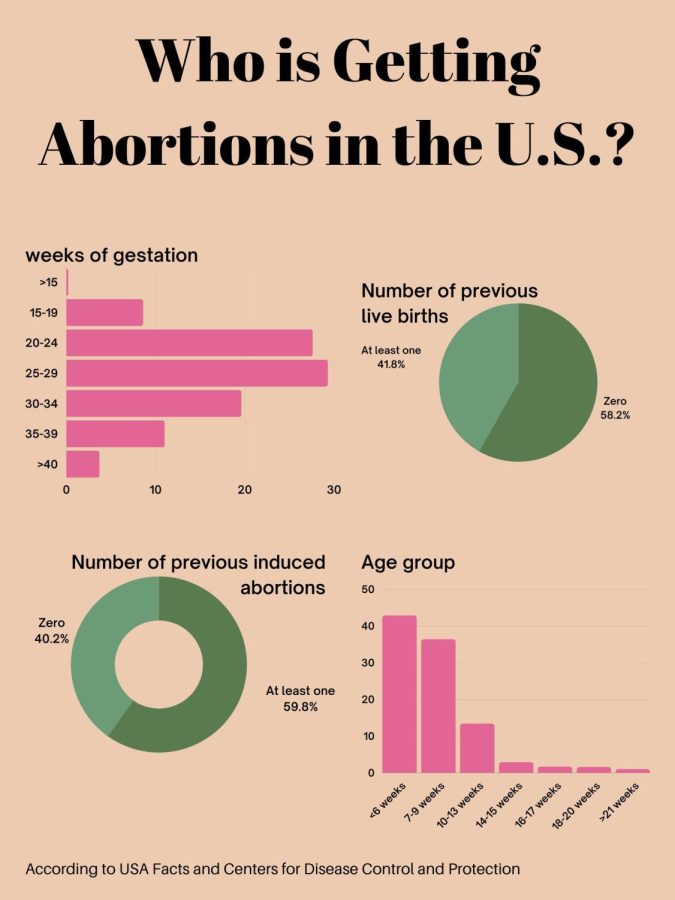Supreme Court Overreach
Roe v. Wade’s overturn detrimentally impacts the female population
According to USA Facts and Centers for Disease Control and Protection
October 19, 2022
On June 24, people with the capacity for pregnancy in 44 of the 50 Unites States were stripped of their rights to make proactive, safe choices for their physical and mental health and well-being. Immediately following the 5-4 Supreme Court ruling, these states’ trigger laws, including Missouri’s, were officially enacted: According to the Guttmacher Institute, nine states ban abortion completely, four states ban abortion at six weeks, one at 15 weeks, one at 20 weeks, nine states at 22 weeks (on the assertion that a fetus can feel pain at 18-20 weeks), four at 24 weeks, 16 states at viability (24 weeks), and one state imposes bans in the third trimester.
As for Missouri, the current law is that abortions are completely banned except in the case of a medical emergency. However, a ruling changing the ban to eight weeks with no exceptions is currently being put into action by the court. There has been significant push-back over the last several months regarding this issue, especially from Democratic Missouri politicians, healthcare providers, and those affected directly: people of childbearing age, which is anywhere from 12-51 years old.
According to an informal Instagram poll conducted by PCH Publications, 12% of voters are against abortion and 88% support abortion rights. In addition, we, the editorial board of the Corral believe that the ban on abortion in Missouri is extremely harmful as it will only create a surplus of unsafe abortions, it can be detrimental to the general well-being of those impacted, restrictions on abortion infringe on the First Amendment to the Constitution, and the regulations in our state make for a very slim chance that someone can actually get access to an abortion.
By banning abortions, whether it be completely or after a given period of time, the Missouri government is forcing serious life-altering consequences on women. According to STL Public Radio, Pamela Merritt, executive director of Medical Students for Choice, feels that the Supreme Court reversing a 50-year-old decision is wrong and will have dire consequences: “The decision is a discredit to the Supreme Court and to the history of law and order and precedent in the United States,” Merritt said. “I think the decision to overturn Roe … is an extreme overreach of judicial power, and ultimately, this overreach will backfire. But in the immediate aftermath, this decision helps no one. It will not decrease abortion. It simply will criminalize it.”
Not only will women seeking an abortion, as well as their healthcare providers, potentially face legal punishment, but when they seek out alternative methods, they may also be putting their lives at risk. According to Doctors Without Borders, over 22,000 women and girls die each year after having an unsafe abortion, and it is one of the five leading causes of maternal mortality across the globe. Many of these methods, including ingesting toxic substances, sharp sticks inserted into the uterus, and infliction of physical trauma, are not effective in terminating a pregnancy but can leave lasting, potentially fatal, damage to the mother.
“In the state of Missouri and the St. Louis region, we have infant and maternal mortality rates for black women and babies that are four times worse than the general population,” Merritt said. “This is both the worst moment to be withdrawing access to reproductive health care and criminalizing abortion.”
While it is heartbreaking that women are no longer given the right to choose what is best for their lives as individuals, it is scary to live in a world where the physical health of women is no longer a concern to our government officials, all due to a cluster of cells in their uterus.
As if it wasn’t enough that a functional piece of legislation was taken away after harming no one for almost 50 years, the U.S. government is now going back on its tried and true 250-year-old standards. In the First Amendment to the Constitution, all people of the United States are granted freedom of speech, press, religion, assembly, and petition. Regardless, five of the Supreme Court justices believe that their Christian views override those of any other minority religions in the country. In some interpretations of the Bible and denominations of Christianity (but not all), life begins at conception, meaning that having an abortion would go against one’s religion. In Judaism, abortion is required (yes, required) in the case that the mother’s life is in jeopardy. In Islam, abortion is prohibited after 120 days of gestation, after which the soul enters the fetus and is confirmed by the Prophet Muhammad. Freedom of religion should mean that it is a person’s constitutional right to be able to decide that for themselves. With the overturn of Roe, however, that right is no more. The reason that the pro-choice movement exists is so that people can have just that: the choice.
The teenage girl community is also subject to the hardships that these policies bring out, and not just in the realm of social media. With the potential Missouri restriction of abortions after eight weeks, that proves to be a bigger issue than politicians (who, shockingly, are not medical professionals with extensive knowledge on the subject) make it out to be.
According to Very Well Family, Jennifer Lincoln, an OBGYN with a significant social media following, says, “Anti-abortion laws will hit [teens] harder as it’s more likely that adolescent pregnancies will be recognized later in teens whose periods may be irregular, or who may not realize they could be pregnant.”
If, however, a teenager does know that they’re pregnant and is weighing their options, there are further hindrances along the way. One is the very slim chance that the only Planned Parenthood facility in the state of Missouri will give an appointment if there is no emergency or dire circumstance.
According to STL Public Radio, Yamelsie Rodriguez, president and chief executive of Planned Parenthood of St. Louis and Southwest Missouri says, “In states like Missouri, we are fighting a compounding crisis made worse because of Defund Planned Parenthood law, which is shorthand for blocking patients from access to preventative health care services at Planned Parenthood health centers.”
About 65% of people coming to the St. Louis clinic are from out of state. They expect to see an additional 40% increase in caseloads by the end of the year, which is why their providers encourage you to travel to Illinois, where women and girls can get abortion access more easily. While St. Louis women are fortunate to have a clinic in the Metro East, it’s still especially detrimental to teens who either cannot travel across state lines on their own or do not have parents who are willing or able to take them (which is also necessary because
they need parental consent).
According to Very Well Family, Rev. Katey Zeh, CEO of the nonprofit, Religious Coalition of Reproductive Choice, “For teens in those states who need abortion care, it will involve making appointments in other states where abortion is legal, requiring them to travel long distances and potentially causing a delay in their care. Teens who don’t have access to transportation or sufficient funds will find it extremely difficult to access care.”
Another common problem that teens are facing when it comes to this issue is the matter of parental consent. Some states, including Missouri, require anyone under the age of 18 to get parental consent to receive abortion care.
“This poses a difficult barrier for teens who do not feel safe confiding in their parents or who otherwise simply cannot obtain parental consent,” Zeh said.
Whether it be because of late knowledge of pregnancy, inability to travel, or reluctance to get parental consent, teens are facing a great deal of challenges if they are in a position where they need but cannot access abortion care. Not only can carrying an unwanted pregnancy to term lead to lifelong challenges, but no 12-year-old rape victim should also be forced by law to carry a baby that their still-developing body is not meant to sustain.
Although Senator Andrew Koenig believes that “this is a major victory for the pro-life movement, and it is the result of decades of hard work to reverse this decision since it was decided nearly 50 years ago,” what he does not realize is how detrimental the overturn of Roe v. Wade and the restrictions in Missouri already has been for the women who are directly impacted. A person who is not a woman, is not a health professional, and does not have an immediate or personal connection to the issue can only do one thing: give women the gosh darn choice.



